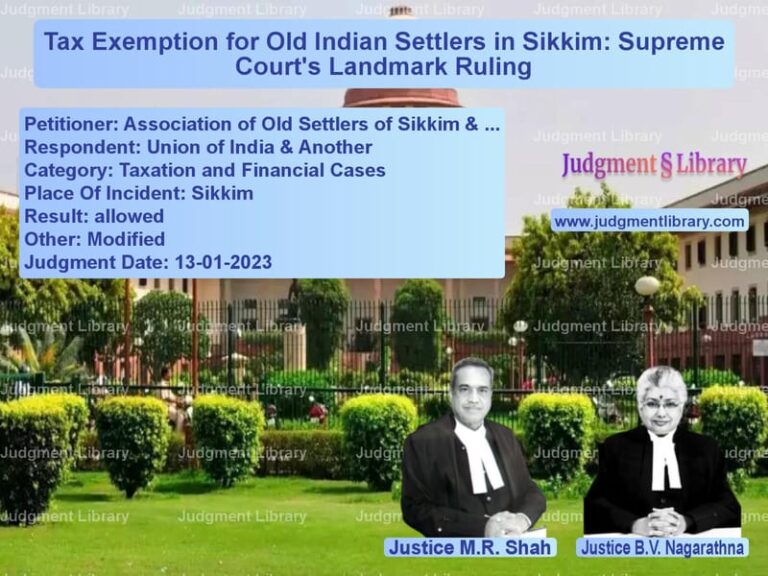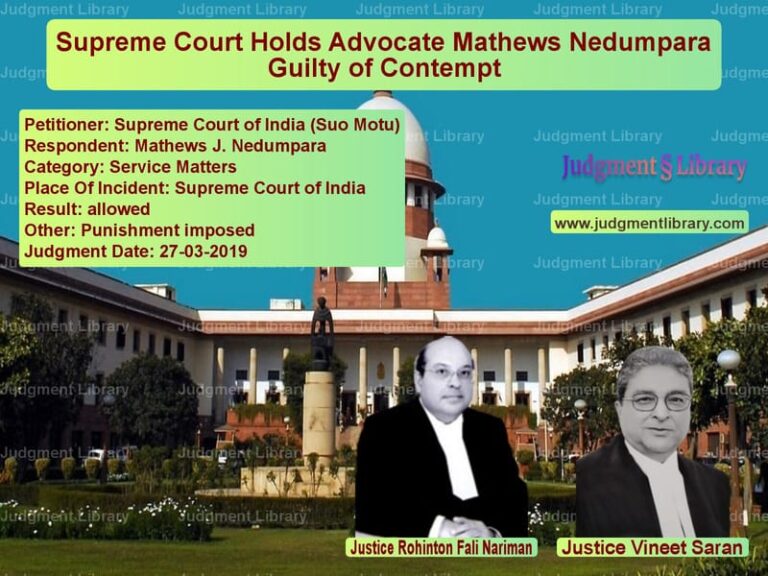Understanding Abetment of Suicide: Supreme Court’s Verdict in Prakash & Others vs. State of Maharashtra
The Supreme Court of India recently delivered a significant judgment in the case of Prakash & Others vs. State of Maharashtra. The case revolved around the unfortunate suicide of Jyoti Nagre, a young woman who had been living separately from her husband due to alleged marital disputes. The appellants were accused of abetting her suicide under Sections 306 and 34 of the Indian Penal Code. However, after reviewing the facts and legal precedents, the Supreme Court discharged the accused, emphasizing the need for a direct and proximate instigation for abetment of suicide.
Background of the Case
The case stemmed from an Accidental Death Report lodged on March 20, 2015, by the deceased’s brother, Vikas Bhausaheb Sanap, stating that Jyoti had committed suicide at her paternal home. Five days later, her mother, Sindhubai Sanap, filed an FIR alleging that Jyoti had faced harassment from her husband Prakash and in-laws. She specifically mentioned an incident on February 17, 2015, during a mahalokadalat (mediation session), where Prakash allegedly told Jyoti that he would not take her back and advised her to remarry.
Following the FIR, the police filed a charge sheet, leading to the appellants seeking discharge under Section 227 of the Cr.P.C. The Assistant Sessions Judge, Sangamner, rejected their application, and the High Court of Bombay upheld this decision. This led to the appeal in the Supreme Court.
Arguments Presented
Arguments by the Appellants
- There was a delay of five days in filing the FIR, and the initial Accidental Death Report did not mention any allegations against the appellants.
- The deceased had been living separately from her husband since August 2013, and they met only once at the mahalokadalat on February 17, 2015.
- The alleged statement by the husband at the mahalokadalat, even if assumed true, did not amount to instigation or abetment under Section 306 IPC.
- The Supreme Court has previously ruled that a time gap between the alleged instigation and the suicide diminishes the causal link necessary for abetment.
Arguments by the Respondents
- The appellants had subjected the deceased to mental and physical harassment, which eventually drove her to take her life.
- The refusal of the husband to accept her back at the mahalokadalat was the final push that led to her suicide.
- The High Court had correctly ruled that these allegations merited a full trial rather than discharge at the preliminary stage.
Supreme Court’s Observations
The Supreme Court thoroughly examined the case, emphasizing the legal principles governing abetment of suicide. The court referred to multiple precedents, stating that:
- For a charge under Section 306 IPC, there must be direct or indirect instigation that leaves the deceased with no option but to commit suicide.
- In Sanju @ Sanjay Singh Sengar v. State of M.P., the court had ruled that a 48-hour gap between the alleged instigation and suicide was sufficient to break the causal link.
- In Ramesh Kumar v. State of Chhattisgarh, the court held that a statement made in a fit of anger cannot be equated with instigation unless it is intended to provoke suicide.
- In Gurjit Singh v. State of Punjab, the court noted that a two-month gap between harassment and suicide negated any proximate connection.
Applying these principles, the Supreme Court found that:
- The mahalokadalat meeting occurred more than a month before the suicide.
- There was no evidence that the appellants had instigated or coerced the deceased to take such an extreme step.
- The delay in filing the FIR and contradictions in statements weakened the prosecution’s case.
Final Verdict
Considering the legal precedents and facts, the Supreme Court ruled in favor of the appellants:
- The judgment of the High Court was quashed.
- The appellants were discharged from all charges.
- All pending proceedings against them were terminated.
The Supreme Court reiterated that criminal law should not be used to prosecute individuals unless there is clear and direct evidence of guilt. Mere disputes and misunderstandings in marital relationships cannot automatically be equated with abetment of suicide unless there is a clear act of instigation.
Petitioner Name: Prakash and Others.Respondent Name: State of Maharashtra.Judgment By: Justice B.R. Gavai, Justice K.V. Viswanathan.Place Of Incident: Ahmednagar, Maharashtra.Judgment Date: 19-12-2024.
Don’t miss out on the full details! Download the complete judgment in PDF format below and gain valuable insights instantly!
Download Judgment: prakash-and-others-vs-state-of-maharashtra-supreme-court-of-india-judgment-dated-19-12-2024.pdf
Directly Download Judgment: Directly download this Judgment
See all petitions in Suicide Cases
See all petitions in Bail and Anticipatory Bail
See all petitions in Judgment by B R Gavai
See all petitions in Judgment by K.V. Viswanathan
See all petitions in allowed
See all petitions in Quashed
See all petitions in supreme court of India judgments December 2024
See all petitions in 2024 judgments
See all posts in Criminal Cases Category
See all allowed petitions in Criminal Cases Category
See all Dismissed petitions in Criminal Cases Category
See all partially allowed petitions in Criminal Cases Category







